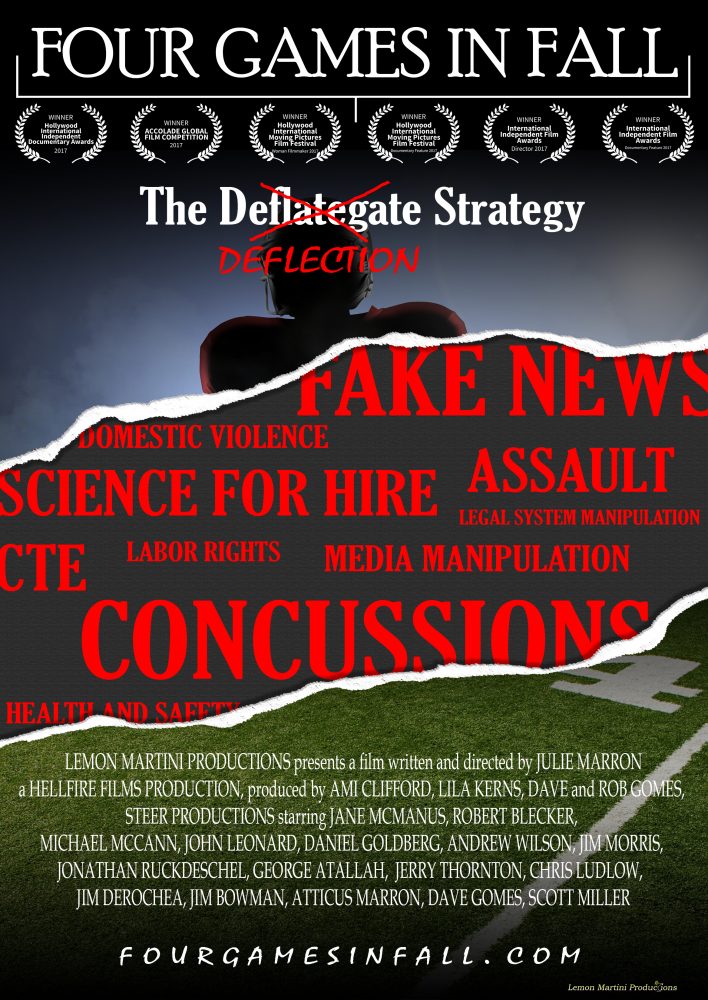Americans tune in religiously for Sunday Night Football 17 weeks of the year, but one game on Jan. 18, 2015, between the New England Patriots and Indianapolis Colts sparked a scandal that led to heated conversation among families and the media — Deflategate.
The intense, and sometimes obsessive, coverage of Deflategate by the press is what caught the attention of Rhode Island filmmaker Julie Marron, inspiring her to create the award-winning feature-length documentary, “Four Games in Fall.” Marron, who lives in Glocester, is not a football fan and insists this is not a fan film, but rather an examination of media manipulation and the problems with companies that provide “science for hire.”
The film will premiere Thursday, March 22, at 7:30 p.m. at the Jane Pickens Theater in Newport and then Saturday, March 24, at 3 p.m. at the Columbus Theatre in Providence.
Through interviews with attorneys, journalists, professors and fans, “Four Games in Fall” examines how accusations of deflated footballs became a national obsession. The film goes beyond football to show that the tactics used by the NFL in this scandal are not unique to the world of sports, but are frequently replicated to manipulate public opinion, influence government regulation, muddy the waters around scientific evidence and unfairly impact the outcome of court cases.
“I just thought the Deflategate scandal provided a unique way to examine these three themes that really interested me — media manipulation, science for hire and abuse of the legal system,” said Marron. “The film uses a manufactured sports scandal as a lens to examine issues that are important and highly topical today, and which are increasingly in headlines.”
Marron was originally drawn to the topic after she heard the NFL had hired Criminal Lawyer Doug Taylor to conduct an independent investigation into the Deflategate scandal. She then became increasingly interested after learning more about the company, Exponent, hired for research in the investigation.
“In some circles, Exponent is known as a firm that is willing to massage data and play with assumptions to create an outcome that favors their client,” Marron said. “I’m sure this isn’t universally the case, and they are a very sophisticated firm, with highly credentialed employees. But the reputation is out there.”
In search of finding a balance to the NFL’s investigation results, Marron’s film contains several interviews with professionals in their respective fields who were outspoken about the Deflategate scandal, reaching out to experts who, as she put it, were “clearly not biased in favor of the Patriots.” This included John Leonard, MIT Professor and Eagles fan.
“Leonard felt compelled to speak out based on what he saw was misrepresentation of the science,” said Marron. “The same with Professor Robert Blecker of the New York Law School, not a fan of the Patriots, but became concerned regarding violations of ethical standards and other issues. The list goes on and on.”
Blecker is featured in the film’s trailer saying, “I believe that someone cheated, but I don’t think it was the Patriots.”
Marron hopes that the film and Deflategate story can serve as a cautionary tale for all walks of life, not just the sports world.
“It gives us the opportunity to explore some important issues that are highly topical and which impact everyone, whether they are aware of it or not,” she said. “It gives us the opportunity to see how our media, which is vital to a functioning democracy, can be manipulated to serve the needs of the powerful. It shows us how entrenched the science-for-hire industry is across the board in our society.”
Production for this documentary, which is produced by Marron’s company, Lemon Martini Productions, began shortly after the Deflategate verdict was made. The Patriots were fined $1 million, lost two draft picks and Tom Brady was suspended for four games, inspiring the film’s title, “Four Games in Fall.” She worked on the film for about a year before beginning to screen the feature and submit it to festivals, where the film has won several awards.
“It’s especially interesting because the person involved, Tom Brady, is arguably the most powerful player in the NFL,” said Marron. “The fact that the NFL had the resources and the leverage to make an example of him should have a chilling effect on the players in the league.”
Photo courtesy of Julie Marron




